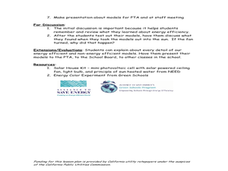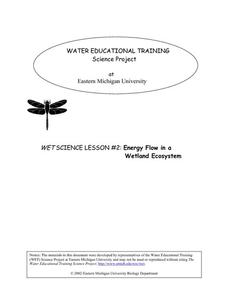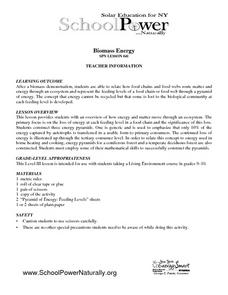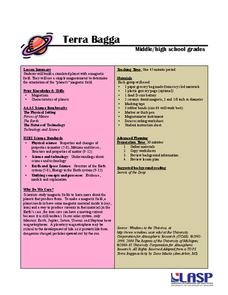Curated OER
Talkin' Trash (All About Landfills)
Students investigate the types of waste created by people and identify various options for trash disposal. They read and discuss a handout about what a landfill is and the different types of trash, match types of trash with the proper...
Curated OER
Now you see it....Now you Don't
Students investigate the biodegrading process of packing peanuts. In this biological process lesson, students conduct an experiment to see how quickly packing peanuts biodegrade. Students check the process each day and record their results.
Curated OER
Going Green School Campaign
Students explore ways to make their school's interior and exterior environmentally 'green.' In this environmental concern lesson, students work in groups to examine their school's interior and exteriors to make them 'green.' Students...
Curated OER
Help! Help! Save the Earth!
First graders analyze ways to save our natural resources and preserve the environment. For this environmental protection lesson, 1st graders complete four activities to analyze the importance of our natural resources and what trash does...
Curated OER
Art Savers
Need a cheap way to get all those fabulous paintings, collages, and drawings home? Learners use old paper towel tubes to create a handy art transportation device.
Curated OER
Recycled Water?
Students participate in a hands-on activity to investigate how water is recycled in a small environment, and determine how water is cycled on earth.
Curated OER
Trash Talkin
Students investigate recycling at several scales, including local, state, national and global. They become aware of recycling, re-use, reduce efforts and policies. Students read the article Where Does Your Garbage Go. They look up where...
NASA
Cleaning Water
Give young scientists a new appreciation of fresh, clean drinking water. After learning about the ways astronauts recycle their air and water, your class will work in small groups creating and testing their very own water filtration...
Curated OER
Green Stuff: Designing an Earth-Friendly Room
In this activity students explore earth-friendly materials that can be used in home environments. They learn about the relationship between the environment and design, and use a variety of problem-solving strategies. They work in...
Curated OER
Pollution
Young ecologists investigate some of the many ways that human activities adversely affect the environment. After identifying the main types of pollution (air, water, soil), 3rd graders fill in a Venn Diagram by pasting cut-out pictures...
Curated OER
Crafting Models of Efficiency
Young scholars build and compare models of both an energy inefficient and efficient classroom. In this energy efficiency lesson, students creatively use recycled materials to build two separate classroom models. They factor in concepts...
Curated OER
The High Cost of Chemical Dependency
Sixth graders explore, analyze and study the effect and impact that humans have on the environment based on their choices as individuals, businesses and governments. They assess the balance between human activities and aquatic pollution.
Eastern Michigan University
Energy Flow in a Wetland Ecosystem
How is energy transferred within an ecosystem? What would happen to a food web if one of the organisms was removed? Elementary or middle school ecologists examine these questions and more in a comprehensive 5E learning cycle lesson....
Curated OER
Biomass Energy
Junior ecologists relate how food chains and food webs route matter and energy through an ecosystem. They trace feeding levels of a food chain or food web through a pyramid of energy. As a reinforcement activity, learners construct three...
Alabama Learning Exchange
Good Litter, Bad Litter
Which ones can be thrown on the ground? Discover the difference between natural litter and unhealthy trash, helping scholars by using several examples. Use the information here to give them a basic background, but also encourage prior...
Macmillan Education
Teamwork
Learners develop self-awareness and discuss the importance of cooperation and communication through worksheets and hands-on, collaborative activities.
Montana State University
Climb into Action!
Climate change affects even the largest and intimidating of landforms—even Mount Everest! A resource helps teach learners the connection between global climate change and its effects on Earth. Activities include videos, class discussion,...
Curated OER
Litter From Lunchtime
Students explore environmental care by participating in a litter identification activity. In this food trash lesson, students discuss the destruction litter causes in our environment and ways we can avoid littering ourselves. Students...
Pulitzer Center
Extractive Industries
Here is a chance for environmental studies classes to take a critical look at crises occurring around the globe by reading articles and viewing video clips. The human activities under scrutiny are the extraction of oil, logging, and...
Virginia Department of Education
Predator-Prey Simulation
Do your pupils have the misconception that environmental predators are "bad" and harm smaller creatures? The simulation explains, in detail, the important role predators play in maintaining a stable ecosystem. Through web-based research,...
University of Colorado
Terra Bagga
One way to identify possible volcanic activity on other planets is by testing the planet for magnetism. A science lesson begins with pupils constructing their own planet from a dead battery, magnets, paper, and tape before labeling the...
Alabama Learning Exchange
Solving Formulas for the Given Variable
Recycle, reuse, and rearrange! Young scholars learn to rearrange formulas to highlight a variable of interest. They then use their new formulas to make calculations.
Curated OER
Recyclign Quest
Students integrate the concept of recycling in to an aerobic activity. After being divided into two classes of students; recyclers and litterers, students participate in activities related to their designation. Students practice...
Curated OER
Think Green
Students experience and practice compositing and recycling through hands-on-activities. They distinguish between which items from their trash can be recycled, composted and reused. The process for making recycled paper is also covered in...

























